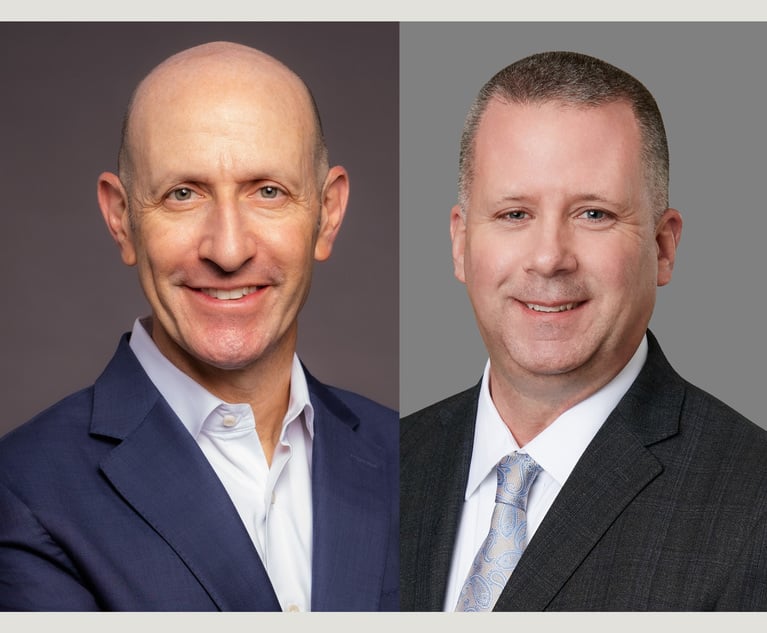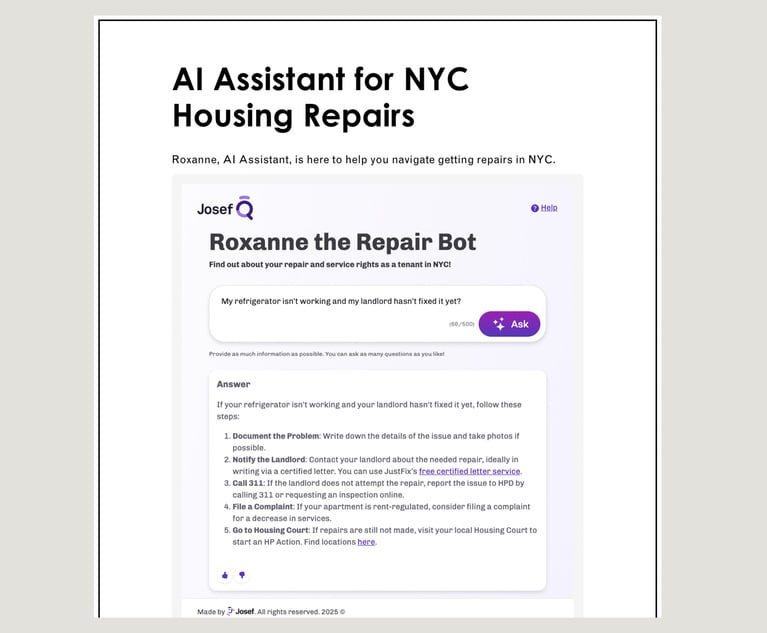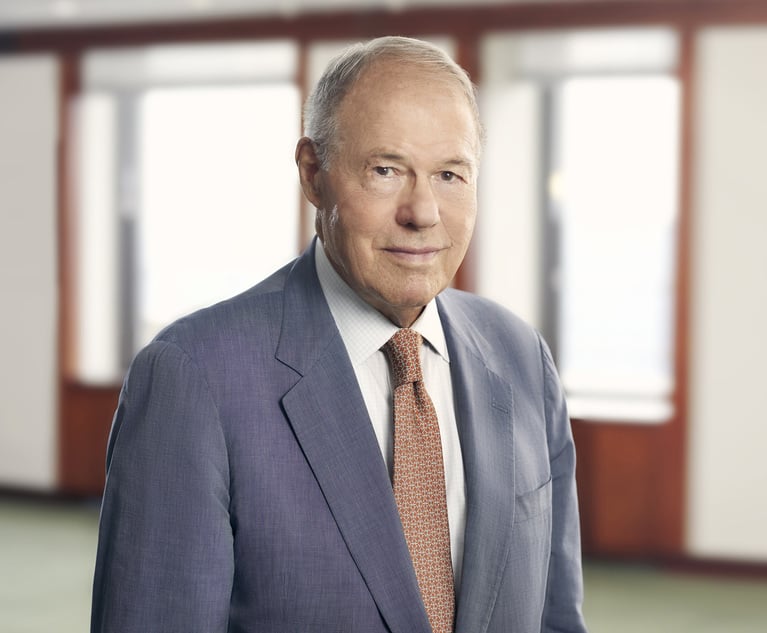New York Loses Federal Appeal Over Millennium Gas Line Project
The state argued that a federal agency was wrong when it said the Department of Environmental Conservation had waived its oversight of the project by failing to decide on the application within a mandated one-year time frame.
March 12, 2018 at 05:38 PM
4 minute read

New York state lost a jurisdiction dispute with the Federal Energy Regulatory Commission Tuesday, after the U.S. Court of Appeals for the Second Circuit declined to review whether the federal energy regulator had big-footed the state when it gave the green light to a controversial natural gas pipeline project in Orange County.
The panel of U.S. Circuit Judges José Cabranes, Debra Ann Livingston and Susan Carney denied the petition for review of two orders by the FERC, made by the New York Department of Environmental Conservation, that authorized Millennium Pipeline Co. to begin construction of a natural gas pipeline to service a local power plant.
Millennium had sought approval of the project from both the FERC and DEC, since the federal Clean Water Act requires projects that potentially impact local waterways to have state water quality certification. The company began the process in mid-November 2015. After subsequent requests for more information to complete its incomplete application, the DEC said it would need until the end of August 2017 to review Millennium's application.
In an attempt to expedite the project, Millennium ultimately was directed in a separate legal action by the U.S. Court of Appeals for the District of Columbia to seek remedy for delay from the FERC, which had already preliminary approved the project.
In July 2017, Millennium requested the federal commission find that the state department had waived its authority under the Clean Water Act, which provides states with a one-year time frame to decide on certification requests. Despite DEC denial of Millennium's application on Aug. 30, 2017—nearly two years since the company's initial submission—the FERC agreed with Millennium a few weeks later, ultimately giving the company the go-ahead to begin construction in October.
Two issues in the dispute were presented to the Second Circuit panel. First, Millennium petitioned the court over the DEC's decision. Second, the DEC petitioned the appellate court for review of the FERC's waiver order.
The panel, then, looked at whether the FERC was correct in finding the DEC waived its right to act on Millennium's application, and whether FERC's jurisdiction under federal law—in this case, the Natural Gas Act—gave it the authority to accept and review Millennium's application.
The panel found that the FERC was right in both regards.
Reviewing the plain language of the Clean Water Act, the panel found the statue “outlines a bright-line rule regarding the beginning of review.” The state's argument that the time limit applies only to complete applications would “blur the bright-line rule into a subjective standard, dictating that applications are 'complete' only when state agencies decide that they have all the information they need,” the panel wrote.
Concerns that enforcing the one-year language would mean rendering premature decisions were “misplaced,” the panel said. It noted a number of options remained available to the department, like denying without prejudice or requesting withdrawal and resubmission.
The panel noted that the issue of jurisdiction was raised by the landowning intervenors, not the DEC, and decided to exercise discretion to “entertain a new argument.”
The Natural Gas Act gives the FERC “plenary authority” over natural gas in interstate commerce situations. The Orange County line, which is linked to interstate pipelines that both run in and out of New York, is just such a line. Despite being entirely inside the state, Millennium's pipeline then falls under FERC's jurisdiction.
A FERC spokesperson declined to comment, citing the commission's policy to not comment on court proceedings.
In a statement sent by a spokeswoman, the DEC said it was aware of the decision and was “reviewing our options to determine any appropriate next steps regarding this pipeline project.”
Private attorney Carolyn Elefant, who represented the landowner interveners, said her clients were disappointed by the decision.
“My clients expended substantial efforts to involve themselves in the [pipeline authorization] process and as a result of this decision, my clients' input will be ignored,” she said in a statement.
This content has been archived. It is available through our partners, LexisNexis® and Bloomberg Law.
To view this content, please continue to their sites.
Not a Lexis Subscriber?
Subscribe Now
Not a Bloomberg Law Subscriber?
Subscribe Now
NOT FOR REPRINT
© 2025 ALM Global, LLC, All Rights Reserved. Request academic re-use from www.copyright.com. All other uses, submit a request to [email protected]. For more information visit Asset & Logo Licensing.
You Might Like
View All
Meet the Long Island Judge Tapped to Be US Attorney for Eastern District of New York
2 minute read
New York’s Property Tax Incentives and Abatements Make Development Feasible
7 minute read
Josef Partners With NYU, Housing Court Answers to Launch AI Assistant Built for Tenants

Trending Stories
Who Got The Work
Michael G. Bongiorno, Andrew Scott Dulberg and Elizabeth E. Driscoll from Wilmer Cutler Pickering Hale and Dorr have stepped in to represent Symbotic Inc., an A.I.-enabled technology platform that focuses on increasing supply chain efficiency, and other defendants in a pending shareholder derivative lawsuit. The case, filed Oct. 2 in Massachusetts District Court by the Brown Law Firm on behalf of Stephen Austen, accuses certain officers and directors of misleading investors in regard to Symbotic's potential for margin growth by failing to disclose that the company was not equipped to timely deploy its systems or manage expenses through project delays. The case, assigned to U.S. District Judge Nathaniel M. Gorton, is 1:24-cv-12522, Austen v. Cohen et al.
Who Got The Work
Edmund Polubinski and Marie Killmond of Davis Polk & Wardwell have entered appearances for data platform software development company MongoDB and other defendants in a pending shareholder derivative lawsuit. The action, filed Oct. 7 in New York Southern District Court by the Brown Law Firm, accuses the company's directors and/or officers of falsely expressing confidence in the company’s restructuring of its sales incentive plan and downplaying the severity of decreases in its upfront commitments. The case is 1:24-cv-07594, Roy v. Ittycheria et al.
Who Got The Work
Amy O. Bruchs and Kurt F. Ellison of Michael Best & Friedrich have entered appearances for Epic Systems Corp. in a pending employment discrimination lawsuit. The suit was filed Sept. 7 in Wisconsin Western District Court by Levine Eisberner LLC and Siri & Glimstad on behalf of a project manager who claims that he was wrongfully terminated after applying for a religious exemption to the defendant's COVID-19 vaccine mandate. The case, assigned to U.S. Magistrate Judge Anita Marie Boor, is 3:24-cv-00630, Secker, Nathan v. Epic Systems Corporation.
Who Got The Work
David X. Sullivan, Thomas J. Finn and Gregory A. Hall from McCarter & English have entered appearances for Sunrun Installation Services in a pending civil rights lawsuit. The complaint was filed Sept. 4 in Connecticut District Court by attorney Robert M. Berke on behalf of former employee George Edward Steins, who was arrested and charged with employing an unregistered home improvement salesperson. The complaint alleges that had Sunrun informed the Connecticut Department of Consumer Protection that the plaintiff's employment had ended in 2017 and that he no longer held Sunrun's home improvement contractor license, he would not have been hit with charges, which were dismissed in May 2024. The case, assigned to U.S. District Judge Jeffrey A. Meyer, is 3:24-cv-01423, Steins v. Sunrun, Inc. et al.
Who Got The Work
Greenberg Traurig shareholder Joshua L. Raskin has entered an appearance for boohoo.com UK Ltd. in a pending patent infringement lawsuit. The suit, filed Sept. 3 in Texas Eastern District Court by Rozier Hardt McDonough on behalf of Alto Dynamics, asserts five patents related to an online shopping platform. The case, assigned to U.S. District Judge Rodney Gilstrap, is 2:24-cv-00719, Alto Dynamics, LLC v. boohoo.com UK Limited.
Featured Firms
Law Offices of Gary Martin Hays & Associates, P.C.
(470) 294-1674
Law Offices of Mark E. Salomone
(857) 444-6468
Smith & Hassler
(713) 739-1250






